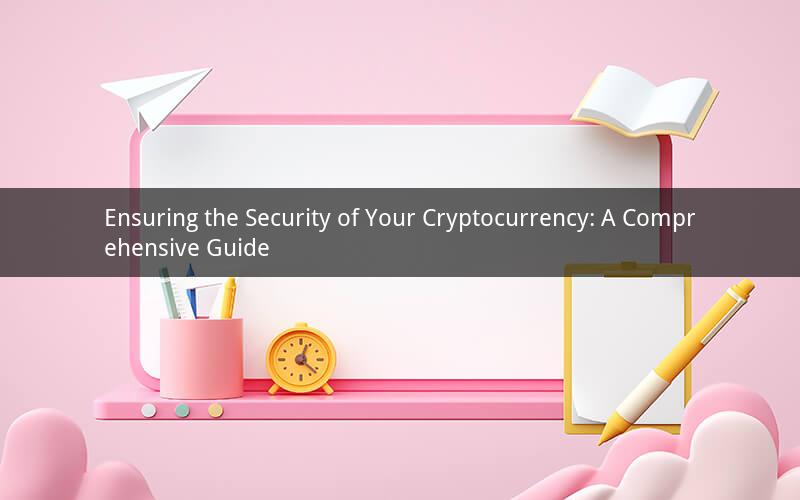
Introduction:
In the rapidly evolving world of cryptocurrency, keeping your digital assets secure is paramount. With the increasing number of cyber threats and scams, it is crucial to implement robust security measures to safeguard your investments. This article will delve into various strategies and best practices to help you keep your crypto secure.
1. Use Strong and Unique Passwords:
One of the fundamental steps in securing your cryptocurrency is to use strong and unique passwords for all your accounts. Avoid using common words, phrases, or sequential patterns. Instead, create a combination of uppercase and lowercase letters, numbers, and special characters. Additionally, ensure that your passwords are not easily guessable by using a mix of unrelated words.
2. Enable Two-Factor Authentication (2FA):
Two-factor authentication adds an extra layer of security to your accounts. By requiring a second form of verification, such as a unique code sent to your mobile device, it becomes significantly harder for hackers to gain unauthorized access. Enable 2FA on all your cryptocurrency exchanges and wallets to protect your assets.
3. Keep Your Software Updated:
Regularly updating your software is crucial in maintaining a secure environment. Cryptocurrency platforms, wallets, and exchanges often release updates to patch vulnerabilities and improve security. Ensure that you install the latest updates promptly to stay protected against potential threats.
4. Utilize Cold Storage:
Cold storage refers to the process of storing your cryptocurrency offline, away from the internet. This method minimizes the risk of hacking and theft. Consider using hardware wallets or paper wallets for long-term storage. Hardware wallets are physical devices designed specifically for storing cryptocurrencies, while paper wallets generate a private and public key pair on paper.
5. Be Wary of Phishing Attacks:
Phishing attacks are one of the most common methods used by cybercriminals to steal cryptocurrency. These attacks involve sending fraudulent emails or messages that appear to be from legitimate sources. Always verify the sender's identity before providing any sensitive information. Be cautious of emails requesting your private keys or login credentials.
6. Use Secure Internet Connections:
Avoid using public Wi-Fi networks for transactions or accessing your cryptocurrency accounts. Public Wi-Fi is often unsecured, making it easier for hackers to intercept your data. Instead, use a secure and encrypted VPN connection to ensure your online activities remain private.
7. Be Mindful of Scams and Fraud:
Stay informed about the latest scams and frauds targeting cryptocurrency investors. Be cautious of unsolicited messages or offers that seem too good to be true. Conduct thorough research before investing in any cryptocurrency or using a service.
8. Backup Your Data:
Regularly backup your cryptocurrency wallets and important data to prevent data loss. In case of hardware failure or theft, having backups ensures that you can restore your assets. Utilize cloud storage or external hard drives for secure data backup.
9. Educate Yourself:
Stay updated with the latest trends, news, and security practices in the cryptocurrency industry. Educating yourself about common threats and best practices will help you make informed decisions and protect your assets.
10. Trust No One:
Never share your private keys or other sensitive information with anyone. Trusting others with your cryptocurrency can lead to loss or theft. Keep your private keys safe and only use them for transactions.
FAQs:
1. Q: Can I keep my cryptocurrency in a regular bank account?
A: No, cryptocurrency cannot be stored in a regular bank account. It requires specialized wallets or exchanges to hold and manage your digital assets.
2. Q: Is it safe to use mobile wallets for storing my cryptocurrency?
A: Mobile wallets can be convenient, but they are generally considered less secure than hardware wallets. Always use reputable mobile wallets and keep your device protected with strong passwords and biometric authentication.
3. Q: Can I recover my cryptocurrency if I lose my private key?
A: Losing your private key means losing access to your cryptocurrency. Without the private key, it is impossible to recover your assets. Ensure you keep backups of your private keys in a secure location.
4. Q: Are there any legal requirements for owning cryptocurrency?
A: The legal requirements for owning cryptocurrency vary depending on the country. Some countries have specific regulations regarding the purchase, storage, and use of digital assets. Stay informed about the legal landscape in your jurisdiction.
5. Q: Can I transfer my cryptocurrency to another person without revealing my private key?
A: Yes, you can transfer your cryptocurrency to another person without revealing your private key. Simply generate a new address and provide it to the recipient for the transaction. This ensures that your private key remains secure.